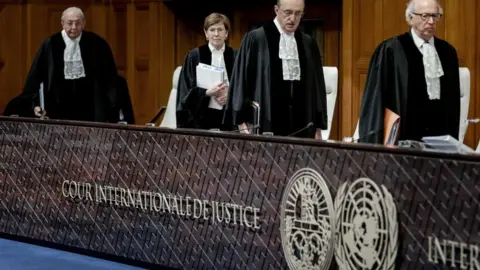The International Court of Justice (ICJ) in The Hague has delivered a preliminary ruling on Friday in South Africa’s case alleging genocide by Israel in Gaza, ordering Israel to stop its military campaign.
At a two-day hearing this month, South Africa asked the court to issue provisional measures requiring Israel to immediately end its military campaign in Gaza, which began after the October 7, 2023 attacks by Hamas militant group.
About 1,200 Israelis, mainly citizens, were killed in the October 7 coordinated attacks, with 240 taken hostage, an estimated 129 of whom are still being held captive. The death toll from the assault on Gaza stands at almost 26,000 – mostly women and children – with a further 7,000 buried under rubble presumed dead. About 85% of the Palestinian territory’s 2.3 million people have been displaced.
The ICJ’s rulings are final and cannot be appealed against, but it has no enforcement powers and Israel’s prime minister, Benjamin Netanyahu, had already said “no one will stop us, not the Hague”.
However, an adverse ruling could lead to sanctions and would put more pressure on Israel’s allies and military backers – including the United States, which previously described the case as “meritless” – to rein it in.
On Thursday, the Israeli government spokesperson, Eylon Levy, voiced confidence about the outcome.
We expect the ICJ to throw out these spurious and specious charges,” he had told reporters.
South Africa’s foreign minister, Naledi Pandor, flew to The Hague to be present for the decision, which is being celebrated in South Africa on Friday.
The 1948 genocide convention, enacted after the mass murder of Jews in the Nazi Holocaust, defines it as “acts committed with intent to destroy, in whole or in part, a national, ethnical, racial or religious group.”
For provisional measures to be enacted, it is not necessary to prove conduct amounting to genocide but that at least some of the alleged acts are capable of falling within the convention.
In court, the South African lawyer Adila Hassim alleged that genocidal acts committed by Israel included the mass killing of Palestinians, causing serious mental and bodily harm to Palestinians, deliberately inflicting conditions of life calculated to bring about the physical destruction of Gaza in whole or in part, and Israel’s military assault on Gaza’s healthcare system.
She had told the court: “Nothing will stop this suffering, except an order from this court. Without an indication of provisional measures, the atrocities will continue; with the Israel Defense Forces indicating that they intend pursuing this course of action for at least a year.”
As well as an immediate ceasefire, South Africa also asked the court to order measures prohibiting the deprivation of access to adequate food and water, humanitarian assistance and medical supplies and assistance.
Israel has rejected calls for a ceasefire, insisting that it will not stop until its goal of destroying Hamas, which it says is the only way to ensure its citizens’ safety, is accomplished.
Tal Becker, the Israeli foreign ministry’s legal adviser, had told the court: “It is in response to the slaughter of 7 October – which Hamas openly vows to repeat – and to the ongoing attacks against it from Gaza, that Israel has the inherent right to take all legitimate measures to defend its citizens and secure the release of the hostages. This right is … not in doubt.”
The president of the court, the American Judge Joan Donoghue, read out the decision at 1pm local time (1200 GMT).
Unlike the International Criminal Court (ICC), which is also investigating alleged war crimes by Hamas and Israel, the ICJ tries only states, not individuals.
Present at the ICJ proceedings were Vusimuzi Madonsela, the South African ambassador to the Netherlands, and Ronald Lamola, South Africa’s justice minister.
Share your story or advertise with us: Whatsapp: +2347068606071 Email: info@newspotng.com

















